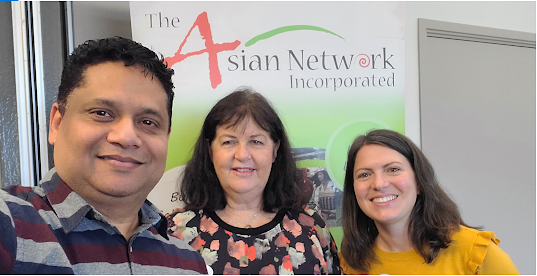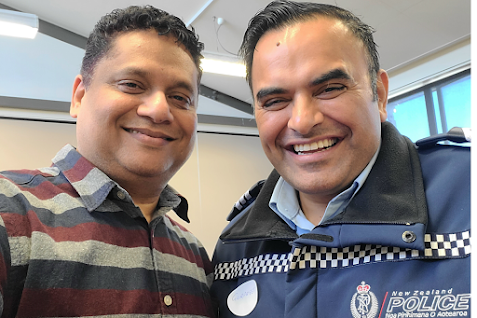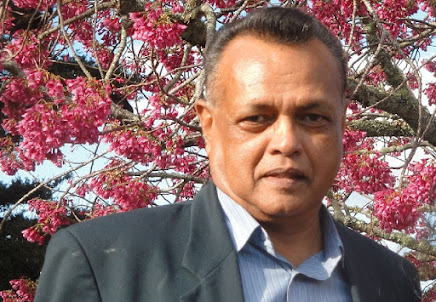FIJI INDIANS IN NZ REACH APEX
OF THEIR ADVOCACY FOR SEARCH OF THEIR IDENTILY
The zenith of Fiji Indians’
organisational leadership in general and their advocacy for identity in
particular was reached in an overflowing Malaeola Community Centre on 7 May
2021, with over 1,600 people. This Mangere, South Auckland venue was the
celebration of 142nd Anniversary of FIJI GIRMIT REMEMBRANCE DAY. And
that is the number of years Fiji Indians have been part of the Pacific – and
some six generations on.

FIJI GIRMIT FOUNDATION NZ Trustees (L-R) Sardar Harnam Singh Golian, Sam Achary and Krishal Naidu with the Girmit Remembrance Day cake
After normal salutations and
acknowledgements, that is exactly what Krish Naidu, a youthful President of the
organisers, FIJI GIRMIT FOUNDATION NZ, advocated.
He very judiciously and
expediently chose the right place and time. This was on the stage overflowing
with Community leaders, diplomats, Government Ministers, Academics, and a
potential National PM, among other politicians in the welcome Presidential speech. His advocacy was
emphatic - and he sounded like a confident sure leader . And this could be
summed as the punchlines of the evening:
We
are Pacific people. We are not asking for a favour - we just wish to be
recognised for what we are.
Fiji Indians needs to be
acknowledged as part of an inclusive Pacific community where diversity within
the Pacific community is embraced and celebrated. An official recognition is
needed from the government beyond the role of Stats NZ.
In his emphatic and forceful welcome presentation with a very attentive audience, Krish Naidu reminded that the Ministry for Pacific Peoples role is to improve outcomes for ALL Pacific Peoples by bringing ALL Pacific voices, perspectives and understanding into policy. He questioned why Fiji Indian voice was silenced and ignored.
He emphasised that to be effective, this
Ministry must also hear voices of ALL Pacific peoples. He championed the view
that Fiji Indians should not be treated as a ceremonial piece. They needed to
be part of official policy framework of Pacific people always, and not merely
when it suits them. He continued:
The taxpayer funded - ministry of
Pacific People is for ALL Pacific People. It is not a ministry for Indigenous Pacific
People alone. This bias - this institutional and structural discrimination - must stop.
And for that, we need real political leadership.
And at that instance, the stage
full of dignitaries and politicians erupted in spontaneous applause at mention
of “need for real political leadership.” And leading them was the
potential National Party Prime Minister, Christopher Luxon.
The stage with some of the dignitaries present on the day: Diplomats, Community Leaders and Politicians listening attentively to the Presidential speech
Perhaps in body language, the current, potential, and past National opposition politicians on the stage were taunting the Labour Party politicians. This is because Labour Party, from the days of David Lange, were always seen to be close and sympathetic to Fiji in general and Fiji Indians in particular.
And appeals from Fiji Girmit Foundation implied that there appeared to be hints
of dereliction of duties from some sections of the Labour Government, the Ministry
of Pacific Peoples and some sections of the bureaucracy who were collectively
or individually not listening or paying attention to their calls and concerns.
Krish
Naidu also reminded that Fiji Indians also featured
negatively with issues like diabetes, heart disease, mental health, with certain
diseases linked to Fiji and their Pacific lifestyle back in Fiji. He repeated
that real gains for the overall New Zealand health system could only be made if
diversity of all Pacific people were captured, as this was not currently done
by the concerned Ministry.
Human Rights Commissioner, Meng Foon, who was a keynote speaker at the function, concurred with stance of Fiji Indian advocacy. He was hopeful some solution to the issue could be found soon as far as human rights was concerned:
The commission is here to support anyone in New Zealand who feel they have been aggrieved or discriminated against. We also support the fair treatment of all, and this includes in the collection of data which could impact the fair distribution of resources.
He said Fiji
Indian community in New Zealand have recently expressed its concerns - and this
was a valid one. The Foundation hopes to find a solution within the framework
of human rights and would be approaching them for assistance if no other
solutions are found.
Apart from this crucial issue for Fiji Indians, the
evening was a fitting tribute to memory of legacies and heritage of Fiji
Indians.
A miracle was that it was a free event that was fully funded by the community,
with no external support, overflowing with snacks, refreshments, kava and of
course very sumptuous dinner and desserts..
This was through enlightened generosity from businesses and individuals
in their community which collaborated to salute
Girmitiyas and consequently provided thousands of dollars’ worth of
services in kind.
The theme of the evening was aimed at remembrance and recognition of Girmitiya descendants. Consequently, some 50 Fiji Indians aged over 80 were honoured with commemorative medals as an appreciation for carrying the flame of the rich Girmit legacy. In addition, the foundation expanded its vision to celebrate and recognize people and institutions for their noteworthy contributions, achievements, and services to the community. The category of awards and recipients for the Girmit Legacy Awards included:
Excellence in Community Services and Leadership
(Supreme Award) - Sam Achary (Read a separate
FIJI PUNDIT article)
Excellence in Grassroots Volunteer Award - Dinesh Chand (Read a separate FIJI
PUNDIT article)
Contribution to Girmit Literature – Dr. Farzana Gounder
Contribution to Arts and Culture - Pooja Cultural Trust
Special Appreciation Award – Kashmir Kaur
The Foundation wished to promote the importance
of 14 May for Fiji Indian Community because it marks the day first Indians arrived
in Fiji, which importantly marks the birth of Fiji Indian identity. And Girmit
marked their foundational history and they do not wish the new generation to be
denied the opportunity to know about their history
- and their rich legacy.
Before 2012, Fiji Indians had
been living in larger numbers in Auckland for over 30 years, but no such event
or organisation were commenced until some visionary unsung heroes initiated
this 9 years ago, and now that seed has grown into a fruit-bearing tree. Fiji
Girmit Foundation NZ, apart from marking the remembrance has grown into an
advocacy body for Fiji Indians and have plans of expansion into other cities and towns of New Zealand.
Christchurch already has a chapter while Palmerston North, Wellington, Dunedin and
even Queenstown are expected to have theirs within this year with support of
the Foundation in Auckland.
Fiji Indians now stand united
and are enlightened about their stolen history and feel proud of their history,
rich legacies, and heritage. And this, among others is the reason why they do
so well as migrants and rarely, if ever make it into negative statistics.
The overflowing response and audience at Malaeola Community Hall during Fiji Girmit Remembrance Day on 7 May 2021 in Mangere, Auckland, New Zealand.
Over the years, FIJI GIRMIT
FOUNDATION NZ has grown from strength to strength, and culminated in the crowning
glory in this memorable event on 7 May 2021 in Auckland. The crowning glory of
the Foundation was realized by the vision of current trustees, very unlike in
many other organizations when the baton was passed to the new generation led by
the current youthful Trustee, Krish Naidu to manage and organise future Girmit
events - and they rocked.
We salute the Trustees, the Executives,
and the organising committee of nine-year-old FIJI GIRMIT FOUNDATION NZ for
bringing such a huge, memorable, and noteworthy Remembrance Day in New Zealand.
Our only hope remains for a
similar event to be emulated by almost forty-year-old Fiji Girmit Council on
the soils where Girmit began - Fiji. And hoping following in the footsteps of
elder Trustees of Foundation in NZ, the ageing Trustees of Fiji Girmit Council
can pass the baton to the new generation to see Girmit Legacy continued on
Fijian soils.
[About the Author:
Thakur Ranjit Singh is a founding Trustee of Fiji Girmit Foundation, a
journalist, a media commentator and blogger at FIJI PUNDIT. He has a
passion for his forebears and Girmit Legacy and has written many articles on them. This is not a
press release of the Foundation but an independent journalistic observation. E-mail:
thakurjifj@gmail.com]





























